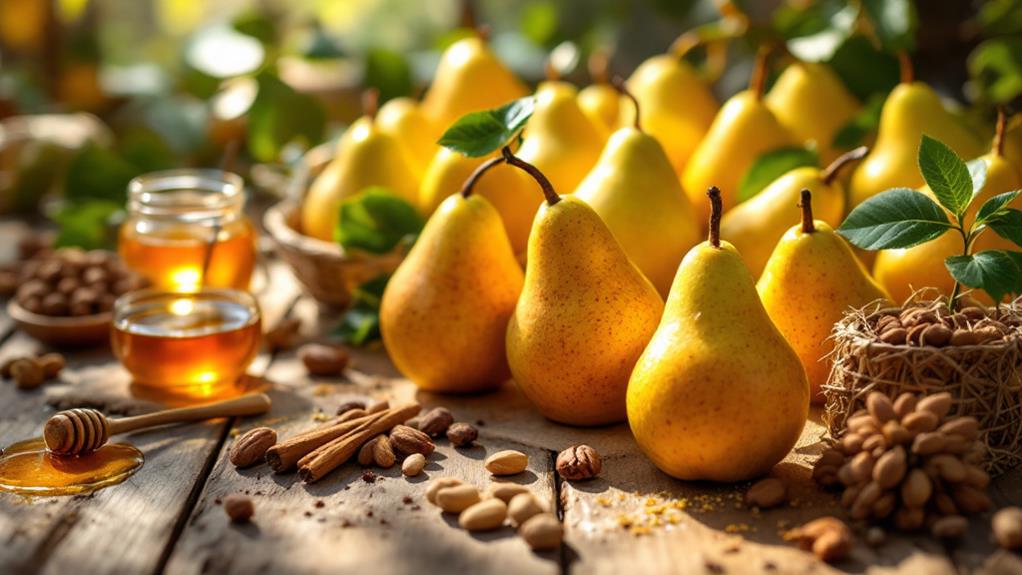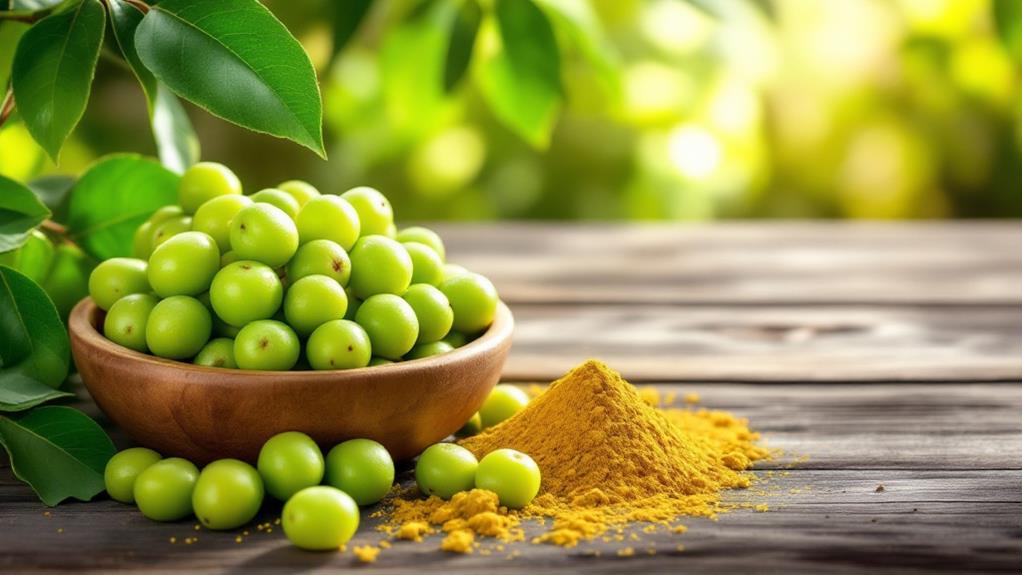A Comprehensive Guide to Nutmeg: Health Benefits and Uses
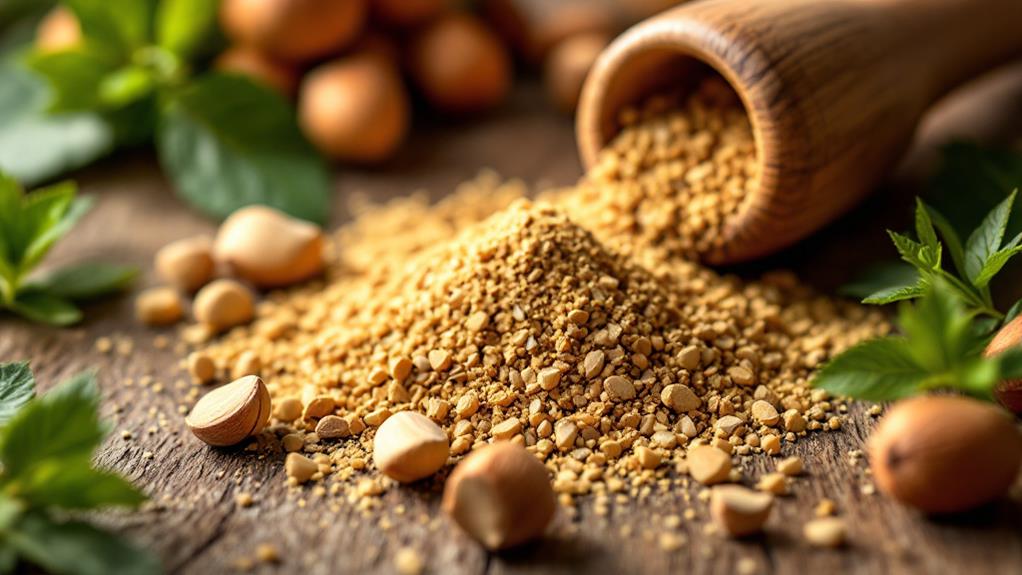
Investigate the wonders of nutmeg, a spice with deep historical roots from the Banda Islands of Indonesia. You'll find it rich in vital vitamins, minerals, and antioxidants that combat oxidative stress and inflammation, potentially lowering chronic disease risks. Nutmeg supports digestion, improves sleep, and even uplifts mood—but always use it in moderation to avoid toxicity. In the kitchen, it spices up both sweet and savory dishes, adding warm, nutty notes. Remember, less is more. Intrigued about how nutmeg's benefits and uses can be utilized further? There's so much more to discover about this spice's legacy and potential.
Nutmeg Origins and History
Nutmeg, a spice with a rich history, originates from the seed of the Myristica fragrans tree found in the Banda Islands of Indonesia, famously known as the "Spice Islands." During the 16th and 17th centuries, it was a coveted commodity in the spice trade, sparking fierce competition among European powers enthusiastic to control its cultivation. The allure of nutmeg extended beyond mere flavoring; it was a symbol of wealth, luxury, and power.
You might be surprised to learn that nutmeg wasn't just valued for culinary uses. In traditional medicine, it was believed to offer numerous health benefits, ranging from digestive aid to a remedy for insomnia. Many cultures have incorporated nutmeg into their medicinal practices, highlighting its invigorating properties.
Today, the legacy of nutmeg continues, with Grenada emerging as one of the largest exporters. This tiny island nation carries on the rich history of nutmeg cultivation, ensuring that the spice's origins in the Banda Islands remain an integral part of its story. As you sprinkle nutmeg into your favorite dishes, you're connecting with a spice that has shaped history and continues to offer both flavor and health benefits.
Nutritional Profile of Nutmeg
When you investigate the nutritional profile of nutmeg, you'll find it's packed with significant nutrients, despite being low in calories. Nutmeg offers fundamental nutrients like vitamins B-complex and C, important for energy production and immune function. Alongside these vitamins, it provides minerals such as calcium, potassium, and magnesium, which are essential for bone health, muscle function, and general well-being.
This spice is also a good source of dietary fiber, promoting digestive health by helping maintain regular bowel movements and stabilizing blood sugar levels. The fiber content contributes to nutmeg's health benefits without adding many calories to your diet.
Nutmeg's richness in fundamental oils, including myristicin, not only gives it a unique flavor but also underpins several potential health benefits. These include fighting oxidative stress, thanks to its high antioxidant content. Nutmeg contains carotenoids and flavonoids, powerful compounds that help protect your body from oxidative damage.
A small serving of nutmeg—about 1-2 teaspoons—provides a notable amount of these beneficial compounds, making it a valuable enhancement to your diet. By incorporating nutmeg, you're enriching your meals with a nutrient-rich spice that supports your health in multiple ways.
Antioxidant and Anti-inflammatory Effects
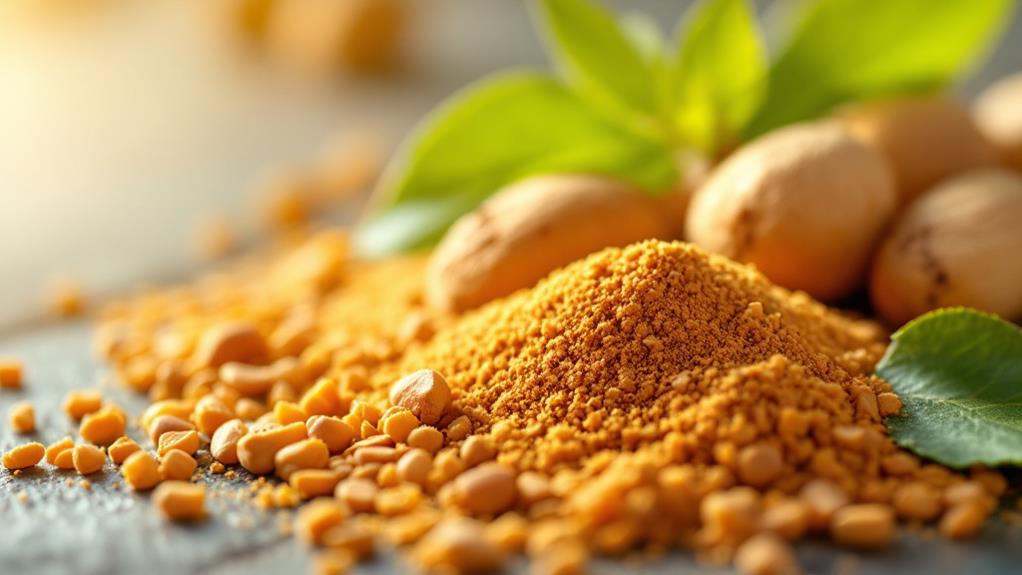
Beyond its impressive nutritional profile, nutmeg stands out for its potent antioxidant and anti-inflammatory properties. It's packed with powerful antioxidants like myristicin and elemicin that play a significant role in protecting your cells from oxidative stress and free radical damage. This protection is essential for reducing the risk of chronic diseases, such as cancer and heart disease. Nutmeg extracts have shown promise in preventing cellular damage, indicating their potential as natural remedies for maintaining cellular health and general well-being.
The anti-inflammatory properties of nutmeg shouldn't be overlooked. Monoterpenes like sabinene and terpineol in nutmeg have been noted for alleviating inflammation-related pain and joint swelling. This makes nutmeg a potential ally in managing inflammation-related conditions and improving your overall health. Moreover, these benefits might extend beyond just physical health. Some studies suggest that nutmeg can boost libido and sexual health, potentially due to its anti-inflammatory and antioxidant effects.
Enhancing Sleep and Mood
A restful night's sleep and a balanced mood are vital components of total well-being, and nutmeg might just be the spice to help in these areas. Nutmeg contains myristicin, which may have sedative properties that could improve your sleep duration and quality. While more human studies are needed, its effectiveness is promising. Furthermore, nutmeg's potential antidepressant effects, as shown in animal studies, suggest it could boost your mood and alleviate depression symptoms.
Rich in antioxidants, nutmeg helps protect brain cells from oxidative stress, which supports better cognitive function and mood stabilization. This protective action contributes to comprehensive mental well-being, making nutmeg a traditional remedy in folk medicine for invigorating the mind.
However, it's essential to enjoy nutmeg in moderation. While it's enticing to capitalize on its health benefits, excessive intake can lead to toxicity and negatively impact your mental health. Always make sure you use this spice cautiously to optimize its benefits without adverse effects. By incorporating nutmeg mindfully into your routine, you might find an ally for improving sleep and mood, contributing to a healthier, more balanced lifestyle.
Culinary Applications and Tips

Release the culinary potential of nutmeg by incorporating it into a variety of dishes that span both sweet and savory domains. Freshly grated nutmeg offers a robust flavor that pre-ground options can't match. When you're preparing sweet dishes like pies, cakes, or custards, a small amount of nutmeg can uplift the taste to a new level. Its warm, spicy notes also improve savory recipes, blending seamlessly into meat-based dishes and creamy sauces.
Nutmeg's versatility shines when you mix it into your favorite spice blends. Pair it with cardamom, cinnamon, and cloves to enrich beverages like chai tea or smoothies. For an unexpected twist, sprinkle a touch over roasted vegetables to add depth and complexity. Remember, a little nutmeg goes a long way—typically, just a quarter teaspoon is enough to refine a recipe without overpowering it.
Experimenting with nutmeg can open up a world of culinary applications, making your meals more flavorful and interesting. So, keep a fresh nutmeg seed and a microplane handy in your kitchen to guarantee you're always ready to grate this aromatic spice into your culinary creations.
Safe Consumption Guidelines
While nutmeg improves your culinary creations with its distinct flavor, it's essential to understand the guidelines for safe consumption to guarantee you enjoy its benefits without risk. Nutmeg is generally safe when used in culinary amounts, but it's significant to adhere to the recommended maximum daily intake of 1-2 teaspoons (approximately 5-10 grams). Exceeding this can lead to nutmeg toxicity, with symptoms like nausea, dizziness, and hallucinations. These adverse effects are particularly concerning for children and sensitive individuals.
Nutmeg should never be consumed in high doses as a recreational drug. Doing so poses potential risks, including serious health complications like organ damage and possibly even death. Pregnant and breastfeeding women should be especially cautious, avoiding high doses due to risks such as miscarriages or birth defects. Always consult with a healthcare professional before using nutmeg as a supplement, especially if you're considering high-dose applications or have underlying health conditions.
Here are a few tips to keep in mind:
- Stick to culinary amounts to avoid toxicity.
- Be aware of potential risks for pregnant women.
- Consult with a healthcare professional for safe usage.
Nutmeg in Traditional Medicine

Historically, nutmeg has been a staple in traditional medicine across diverse cultures, valued for its potential analgesic and sedative properties. You've likely encountered nutmeg's role in folk medicine, where it's believed to invigorate the body and enhance mood. People have used it to tackle insomnia and stress-related conditions. Its vital oil is popular in aromatherapy, offering calming effects that promote relaxation and mental clarity.
In terms of digestive health, nutmeg is quite the powerhouse. Traditional remedies often incorporate it to alleviate bloating, gas, and indigestion. These health benefits make it a go-to choice for soothing digestive woes. Nutmeg's bioactive compounds are key to its therapeutic effects. They include anti-inflammatory and antimicrobial properties, which reinforce its place in traditional healing practices.
Research into these bioactive compounds continues to reveal nutmeg's potential. Its anti-inflammatory compounds can help reduce inflammation, while its antimicrobial properties might ward off certain pathogens. This combination of effects makes nutmeg a fascinating ingredient in traditional medicine. So, regardless of if you're sipping on a nutmeg-infused remedy or enjoying its aroma, you're tapping into a long history of health benefits and therapeutic effects.
Comparing Nutmeg and Mace
As you appreciate the health benefits of nutmeg in traditional medicine, it's intriguing to investigate its close relative, mace. Both spices come from the *Myristica fragrans* tree, with nutmeg being the seed and mace as its dried outer covering. They share similar health benefits, boasting impressive antioxidant effects and antibacterial properties. However, mace might pack slightly more vital oils, improving its unique qualities.
In cooking, nutmeg and mace add distinct flavors to your dishes. Nutmeg is a favorite in baked goods and savory dishes, imparting a warm, sweet, and slightly nutty flavor. On the other hand, mace offers a delicate, spicier profile, popular in sauces, soups, and as a seasoning for meats. This makes it a flexible choice in numerous culinary traditions, especially in Indian and Middle Eastern cuisines.
Here are some quick points about nutmeg and mace:
- Flavor: Nutmeg is sweet and nutty, while mace is spicier and more aromatic.
- Usage: Nutmeg shines in holiday recipes; mace improves sauces and savory dishes.
- Health: Both provide antioxidant and antibacterial benefits, with mace having more vital oils.
Embrace both spices to raise your culinary adventures!
Substitute Spices for Nutmeg
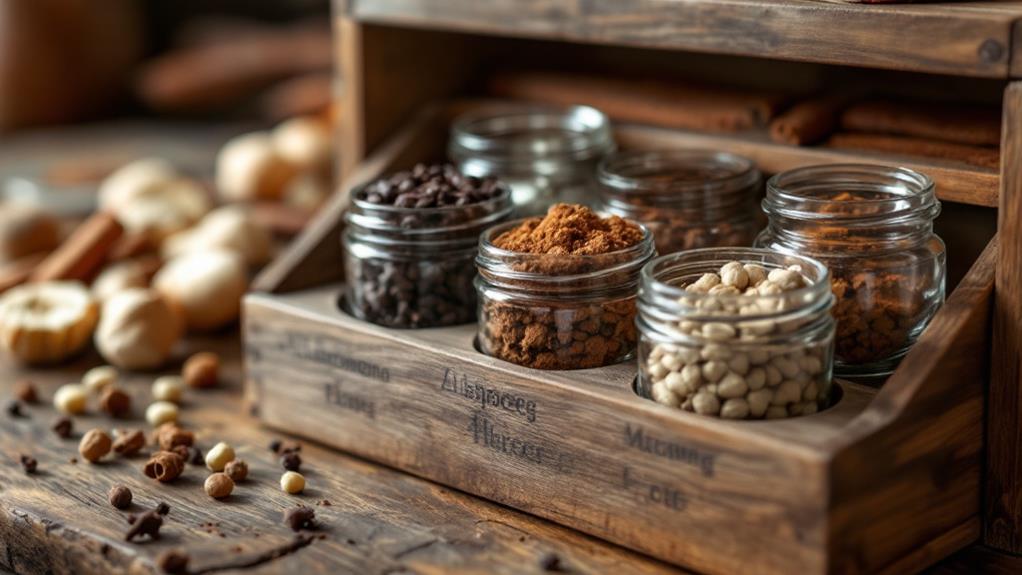
Often, you might find yourself in the kitchen without nutmeg on hand, but don't worry — there are several effective substitutes to contemplate. Mace, the dried covering of the nutmeg seed, is a direct substitute in recipes, offering a similar flavor profile with a slightly more delicate taste. If you're baking or preparing a spice blend, allspice is a great alternative. Its warm and aromatic flavor closely resembles nutmeg, making it a versatile option for both sweet and savory dishes.
Cinnamon is another popular substitute, particularly in desserts and beverages. It provides a warm, sweet flavor that complements many recipes. For a more complex flavor, consider mixing cinnamon with ginger. This combination can mimic the spiciness of nutmeg, especially in dishes like pumpkin pie and other spiced desserts.
Cardamom is also worth considering as a substitute. It offers a unique, floral, and spicy flavor that enriches both sweet and savory dishes, particularly in Middle Eastern and Indian cuisines. Experimenting with these spices can help you maintain the desired flavor in your dishes, even when nutmeg isn't available.
Research and Future Insights
While nutmeg is valued for its culinary uses, recent research is uncovering its significant health benefits. Studies show that nutmeg possesses impressive antioxidant properties, with compounds like myristicin potentially protecting against oxidative stress and cellular damage. Researchers are also investigating its antibacterial and anti-inflammatory activities, emphasizing the necessity for further investigation to understand its full pharmacological effects.
Nutmeg's micronutrients might help regulate blood pressure, suggesting a promising role in managing cardiovascular health. However, its psychoactive properties call for caution. Consuming large quantities could lead to effects that aren't fully understood yet, so it's important to be informed about its safety profile. Future research aims to elucidate nutmeg's therapeutic potential, ensuring that you can make informed choices about its dietary and medicinal applications.
Here's what you should know about nutmeg:
- Antioxidants: May protect against oxidative stress and cellular damage.
- Cardiovascular health: Could help in the regulation of blood pressure.
- Therapeutic potential: Ongoing research is crucial to understand its full benefits and safety.
As scientists continue to investigate nutmeg, staying updated on new findings will help you make the most of its health benefits.



